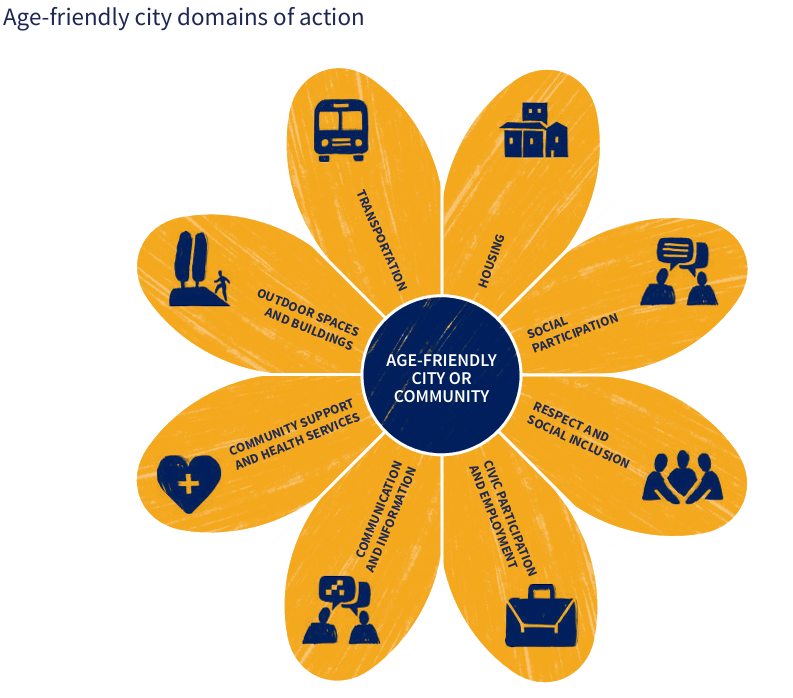Creating age-friendly communities is essential to promoting healthy ageing and ensuring that older adults remain active, engaged, and socially included. The World Health Organization’s (WHO) Age-Friendly Cities and Communities framework provides a comprehensive approach to designing environments that support physical, social, and economic participation at all stages of life (WHO, 2024). Cumberland has embraced this framework, aligning its initiatives with the eight key domains of action outlined by the WHO. These domains ensure that ageing populations can maintain independence, access essential services, and actively engage in their communities.
The Eight Domains of Age-Friendly Communities
The WHO’s framework highlights eight interconnected domains that contribute to creating inclusive, supportive environments for older adults. These domains are:
Outdoor Spaces and Buildings: Ensuring that public spaces, parks, and buildings are accessible, safe, and welcoming for older adults.
Transportation: Providing affordable, reliable, and accessible transport options to enable older adults to move around independently.
Housing: Offering a range of housing options that are affordable, adaptable, and suitable for ageing in place.
Social Participation: Encouraging older adults to engage in social, cultural, and recreational activities to reduce isolation and promote well-being.
Respect and Social Inclusion: Fostering a culture of respect and inclusion for older adults, ensuring they feel valued and integrated into community life.
Civic Participation and Employment: Supporting older adults to remain active in the workforce or volunteer sectors, contributing their skills and experience.
Communication and Information: Ensuring that information is accessible and easy to understand, particularly for those with sensory or cognitive impairments.
Community Support and Health Services: Providing accessible, high-quality health and social care services tailored to the needs of older adults.

Figure 8: WHO Age-Friendly City Domains of Action
Source: World Health Organization (WHO), Age-Friendly Cities Framework.
These domains are not standalone; they are interconnected, and progress in one area often supports improvements in others. For example, accessible transportation enables older adults to participate in social activities, while inclusive housing supports their ability to live independently.
Cumberland's Age-Friendly Initiatives
Cumberland has taken significant steps towards becoming an age-friendly community, aligning its policies and initiatives with the WHO framework. Key initiatives include:
The Cumberland Age-Friendly Board: Established to drive policy and initiatives that improve housing, transport, healthcare, and social inclusion for older adults (Cumberland Council, 2024).
Age-Friendly Partnership Groups: Working in Carlisle and West Cumberland to engage older residents in shaping local services and promoting inclusivity.
Community-Based Support Networks: Expanding initiatives like befriending programmes, social clubs, and volunteer networks to combat loneliness and ensure older adults feel valued within their communities.
These initiatives reflect Cumberland’s commitment to creating an environment where older adults can thrive. By addressing the eight domains of the WHO framework, Cumberland is working to ensure that public spaces, services, and infrastructure cater to the needs of an ageing population, promoting well-being, independence, and social connectivity.
The Role of Age-Friendly Communities in Healthy Ageing
Age-friendly communities play a crucial role in supporting healthy ageing. By addressing the social determinants of health, such as housing, transport, and social inclusion, these communities help reduce the risk of frailty, social isolation, and poor health outcomes. For example, accessible outdoor spaces and buildings encourage physical activity, which is essential for maintaining mobility and reducing the risk of falls (de Labra et al., 2015). Similarly, social participation and community support networks help combat loneliness, which is a significant risk factor for mental health issues and frailty (Walsh et al., 2023).
Cumberland’s efforts to build age-friendly communities are already showing positive effects. Initiatives like the Live Longer Better in Cumbria programme, which promotes physical activity and social engagement, are helping older adults stay active and connected (Active Cumbria, 2024). Similarly, the integration of health and social care services through initiatives like Carlisle Healthcare’s Elderly Care Services ensures that older adults receive holistic support tailored to their needs (Carlisle Healthcare, 2024).
Moving Forward: Embedding Age-Friendly Principles
To further embed age-friendly principles into its policies and practices, Cumberland must continue to prioritise the following:
Engaging Older Adults: Ensuring that older residents are actively involved in decision-making processes, from planning to implementation.
Addressing Inequalities: Targeting resources towards deprived and rural areas where older adults face greater barriers to accessing services.
Collaborating Across Sectors: Strengthening partnerships between local authorities, healthcare providers, and third-sector organisations to deliver integrated, age-friendly services.
Monitoring Progress: Regularly evaluating the impact of age-friendly initiatives to ensure they are meeting the needs of older adults.
By adopting a holistic, age-friendly approach, Cumberland can create a more inclusive and supportive environment for its ageing population, ensuring that older residents can lead fulfilling, active, and socially engaged lives.